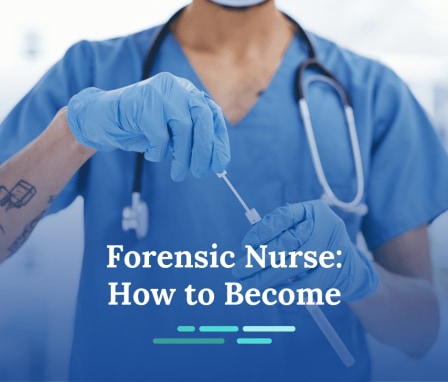How to Become a Forensic Nurse
Are you ready to earn your online nursing degree?
 Credit: PeopleImages / iStock / Getty Images Plus
Credit: PeopleImages / iStock / Getty Images PlusForensic nurses help merge the healthcare and legal systems. They are skilled in treating patients with trauma related to violence and disaster and providing them with emotional support. This nursing specialty involves collecting evidence, serving as an expert witness in court, and collaborating with law enforcement.
Find out how to become a forensic nurse, including education, certification and licensure, salary data, potential career tracks, and other important considerations.
How Long to Become
2-3 years
Degree Required
ADN or BSN
Certification Recommended
Certified forensic nurse, Sexual assault nurse examiner, Advanced forensic nursing certification (renewal only)
Popular Online RN-to-BSN Programs
Learn about start dates, transferring credits, availability of financial aid, and more by contacting the universities below.
What Is a Forensic Nurse?
Forensic nursing is a broad field with concentrated areas of practice. The International Association of Forensic Nurses (IAFN) defines the profession as “the practice of nursing globally when health and legal systems intersect.”
A forensic nurse receives specialized training that integrates the latest thinking in healthcare, forensic science, and criminal justice. Bridging the gap between healthcare and the law, forensic nurses provide treatment and legal support for survivors of abuse, assault, neglect, violence, mass disasters, and similar events.
Becoming a forensic nurse opens the door to a nursing career that helps solve crimes and achieve justice. These professionals work closely with law enforcement by performing detailed physical examinations and collecting evidence. Another key role is providing emotional and psychological support to the patient.
Forensic nurses can serve as part of multidisciplinary teams in rape crisis centers, hospitals, coroner’s and medical examiner’s offices, prisons and jails, and psychiatric hospitals. They may also be part of quick-response units that mobilize when communities are facing a crisis.
The work of the forensic nurse calls for critical thinking skills, physical assessment, compassion, attention to detail, and good communication skills. An understanding of the law is also important in forensic nursing.
Steps to Becoming a Forensic Nurse
Forensic nursing is a specialty and requires a registered nurse (RN) license. You can become a licensed RN by obtaining an associate degree in nursing (ADN) or a bachelor of science in nursing (BSN).
Some employers and positions may require forensic nursing certification and experience, but others may hire RNs with medical-surgical (med-surg) experience and provide on-the-job training.
- 1
Earn Your Degree
Most ADN programs require a high school diploma or GED certificate, academic transcripts, and an application. With 2-3 years of community college education, a nurse can graduate, pass the NCLEX, receive a nursing license, and pursue a forensic nursing position.
There are several types of BSN programs. A traditional BSN is a four-year degree where students develop a foundation in nursing care, anatomy and physiology, nursing informatics, and other subjects.
Nurses with ADNs can enter RN-to-BSN degree bridge programs. These curricula typically allow students to transfer most or all of their ADN credits. Many nursing students in bridge programs can earn their BSN in 12-18 months.
If you have a bachelor’s degree in a non-nursing field but wish to transition to nursing, you can enroll in an accelerated BSN program.
- 2
Pass the NCLEX Exam to Receive RN Licensure
Passing the NCLEX is necessary to become a forensic nurse. Every nursing program graduate who wants to earn an RN license must pass the NCLEX. State boards of nursing use the exam to decide if candidates qualify for nursing licensure.
- 3
Gain Experience in Infusion Therapy
Clinical nursing experience plays a key role in becoming a forensic nurse. Forensic nurses need strong assessment and communication skills. Working on a med-surg floor can provide a good clinical background. Mental health and pediatrics are also excellent places to gain relevant experience. Nurses with solid experience, a strong resume, an interest in forensics, and good networking skills can often find employment in an entry-level forensic nursing position. Mastering interviewing skills for nursing jobs can also help.
- 4
Gain Experience in Infusion Therapy
Nurses can validate their knowledge, experience, and professional dedication — and improve their employment prospects — by obtaining certification. These programs typically offer a combination of clinical training and classroom hours and focus on a specific area of forensic nursing.
The American Institute of Health Care Professionals, Inc. offers a forensic nursing certification for licensed RNs and nurse practitioners specializing in forensic nursing practice. This certified forensic nurse certification program focuses on all aspects of forensic nursing, including forensic pathology. Upon completion of the professional continuing education program and receipt of the certification, the credentials FN-CSp may be used.
The IAFN offers two tracks for professional credentials for nurses who specialize in sexual assault cases.
- Certified adult/adolescent sexual assault nurse examiner (SANE-A) focuses on adult and adolescent patients. SANE-A training covers forensic evidence collection, crisis intervention, sexually transmitted infections testing, drug testing, and emergency contraception.
- Certified pediatric sexual assault nurse examiner (SANE-P) focuses on pediatric patients and is the most in-demand forensic nurse certification. SANE-P nurses receive training in forensic examination, photography, and procedures for providing court testimony.
Before taking the SANE exam through the American Nurses Credentialing Center (ANCC), the nurse applicant must meet the following eligibility requirements:
- Complete a SANE training course that meets IAFN SANE education guidelines
- Receive a minimum of 40 hours of SANE training
- Complete a preceptorship that meets IAFN SANE education guidelines
- Accrue at least 300 hours of SANE-related practice in the last three years
- Read the certification handbook
- Complete and submit the application
The ANCC also previously offered an Advanced Forensic Nursing Certification (AFN-BC) certification. Although this certification program ended in late 2017, the ANCC continues to offer recertification.
Forensic Nurse Education
Becoming a forensic nurse first requires earning a nursing degree, often an ADN or a BSN. A master of science in nursing (MSN) can also be an option if the nurse intends to advance toward greater career independence and earning power.
ADN Degree
An ADN diploma is the shortest path to becoming a forensic nurse. With 2-3 years of community college education, a nurse can graduate with an ADN, take and pass the NCLEX, receive a nursing license, and pursue a forensic nursing position.
The ADN is the minimum degree needed to take the NCLEX and is best suited for those who would like to enter the nursing workforce as quickly as possible. Some employers may prefer or require candidates with a BSN, while others hire qualified ADNs.
- Admission Requirements: GED certificate or high school diploma; GPA of 2.0 or higher; completion of high school math, biology, chemistry, English, world languages, and humanities; ACT or SAT scores; completed application and transcripts
- Program Curriculum: Introduction to the nursing profession; professionalism in nursing; health assessment; microbiology and immunology; medical-surgical nursing; pediatric nursing; maternal-newborn nursing
- Time to Complete: Two years
- Skills Learned: Physical assessment; therapeutic and professional communication; critical thinking; organization; hands-on nursing skills
BSN Degree
The coursework often associated with the BSN degree offers a broader knowledge base and greater expertise than other curricula. It often takes four years — sometimes longer — to earn this degree.
A BSN positions you for greater employment opportunities and higher salary options. This degree is best suited for nurses looking for a career as a nurse manager, administrator, or educator.
- Admission Requirements: High school diploma or GED certificate; high school and/or college transcripts; resume or curriculum vitae; SAT or ACT scores; prior completion of microbiology, anatomy and physiology, statistics, and chemistry; at least a 3.0 GPA
- Program Curriculum: Anatomy and physiology; community health nursing; pharmacology; leadership and management; nursing informatics; research and statistics; pathophysiology; psychology; clinical and lab components
- Time to Complete: Four years on average
- Skills Learned: Physical assessment; therapeutic and professional communication; critical thinking; organization; practical nursing skills; leadership and management; evaluation of scientific research
MSN Degree
An MSN degree in forensic nursing provides nurses with more career possibilities, including independent practice in states that allow autonomous advanced nursing practice. The MSN is the minimum degree to become an advanced practice registered nurse (APRN). It is best for nurses who wish to pursue greater specialization, independence, and clinical responsibility.
- Admission Requirements: BSN, unless enrolled in an RN-to-MSN bridge program
- Program Curriculum: Advanced pharmacology; advanced pathophysiology; forensic nursing; legal and ethical issues in nursing; advanced corrections; theory and research; advanced physical assessment; diverse populations; practicum or capstone experience
- Time to Complete: 2-3 years
- Skills Learned: Advanced physical assessment and forensic examination; legal concepts in nursing and forensics
Forensic Nurse Licensure and Certification
Becoming a forensic nurse requires licensure as either an RN or an APRN. Once a nurse has passed a licensing exam, continuing education requirements are regulated by each state’s board of nursing.
Certification is not required to be a forensic nurse, but it is recommended. It can help with career advancement and greater employment options. Significant forensic experience is typically required to succeed in the certification exam.
The IAFN offers two certification tracks:
- SANE-A
- SANE-P
To sit for either exam through the ANCC, the nurse applicant must meet the following eligibility requirements:
- Complete a SANE training course.
- Undergo 40 hours of SANE training.
- Complete a SANE preceptorship experience.
- Accumulate a minimum of 300 hours of SANE-related practice.
- Submit completed application.
Working as a Forensic Nurse
A nurse’s clinical experience and professional resume largely determine their ability to find a position and become a forensic nurse. Skills in networking, the job search process, and interviewing are also factors.
After graduation, traditional job sites and boards can be great platforms to search for a nursing position, including in forensic nursing. In particular, professional organizations and networking sites like LinkedIn can be valuable resources for job searching.
Forensic nurses also work in settings like coroner’s and medical examiner’s offices, corrections facilities, domestic violence centers, and psychiatric hospitals. Forensic nurses may need to respond to mass disasters or community crisis situations.
Forensic nurses subspecialty areas include:
- Autopsy nurse
- Correctional nurse
- Forensic clinical nurse specialist
- Forensic geriatric nurse
- Forensic nurse investigator
- Forensic pediatric nurse
- Forensic psychiatric nurse
- Legal nurse consultant
- Nurse coroner
- Nurse death investigator
- Sexual assault nurse examiner
Current salary data indicates that forensic nurses may often earn less money than many of their nursing colleagues. According to ZipRecruiter, the average salary for a forensic nurse in 2024 is $65,470 per year. Meanwhile, the U.S. Bureau of Labor Statistics (BLS) reports that RNs earned a median annual salary of $86,070 in 2023.
At the same time, the BLS projects 6% annual growth for the entire nursing field between 2022 and 2032 — twice the national average of 3% for all occupations.
Frequently Asked Questions About Becoming a Forensic Nurse
It typically takes 2-3 years to become a forensic nurse, although this number can vary based on the degree.
Related Pages

The 35 Best Specialty Career Choices for Nurses
Explore the best specialty career options available to nurses while reviewing the potential job growth and salary potential for each.

Meet a Forensic Nurse
The emerging field of forensic nursing offers opportunities to work at the intersection of medicine, law, and criminal justice. Read on for details about this challenging and rewarding career.

Angelina Jolie Advocates for Nonbiased Forensic Technology for Survivors of Domestic Violence
Angelina Jolie advocates for non-biased forensic technology that detects bruising on all skin types. This approach can help domestic violence survivors on whom bruising is less visible.